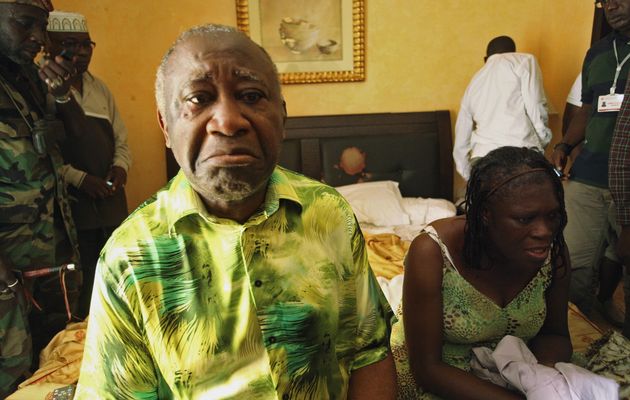
Image by: STRINGER / REUTERS
The 65-year-old wife of ex-president Laurent Gbagbo wore a yellow silk dress and tressed hair as she faced the judge, while outside riot police were deployed and officers body-searched people entering the law courts.
The trial is viewed as the biggest judicial challenge faced by the post-crisis government of the west African nation.
Nicknamed the “Iron Lady”, Gbagbo is being tried for her role in events leading to months of post-election violence that left some 3,000 people dead and badly rattled the economy of the prosperous cocoa-producing nation.
Violence broke out in Ivory Coast in 2010 when Laurent Gbagbo refused to cede power to his rival Alassane Ouattara, who was declared the winner of a presidential poll.
Laurent Gbagbo himself has been held for three years in The Hague facing charges of crimes against humanity by the International Criminal Court (ICC). But Ivory Coast has repeatedly refused to hand his wife over to the ICC on the same charge.
The presidential couple were arrested April 11, 2011 after five months of fierce fighting after a final push by French forces against their residence.
Pictures at the time showed the once-powerful wife, a leading political figure accused of links with anti-Ouattara “death squads”, haggard, fearful and unkempt, her usually stylish hair a mess.
Simone Gbagbo had been held under house arrest in Odienne in the northwest of the country since April 2011 but was transferred to the economic capital, Abidjan, on December 1 ahead of the trial.
Among those seated in the dock next to her, smiling for the cameras, was Gbagbo’s last prime minister Gilbert Ake N’Gbo and Affi N’Guessan, head of the Ivorian Popular Front (FPI) party.
Proceedings Friday were expected to be limited to jury selection, with hearings beginning in earnest on January 5.
“This trial has been rushed through to obtain five million euros pledged by the EU as part of a programme to rehabilitate the Ivorian justice system,” one defence lawyer said.
Simone Gbagbo’s fate has been at the centre of intense negotiations between Ivory Coast and the ICC, with Abidjan refusing her transfer to The Hague on the grounds that it would undermine the political reconciliation process and that the country is perfectly equipped to stage a just trial.
Ivory Coast recently appealed an ICC demand to hand her over on the grounds that the authorities “were not taking tangible, concrete and progressive steps aimed at ascertaining whether Simone Gbagbo is criminally responsible” for crimes against humanity.
“The procedure examined by the ICC in no way stops the national authorities from starting procedures,” ICC spokesman Fadi el-Abdallah said this week.
The ICC works on a complementarity basis to national courts of its member states.
It will only step in if countries themselves are unable or unwilling to put suspected perpetrators on trial.
FRENCH VERSION
Gbagbo, qui a eu lieu pendant trois ans et est égalementrecherché par un tribunal international pour crimes contrel’humanité, est entré dans la Cour d’Abidjan où elle est passant enjugement avec les 82 autres, acclamations et lesapplaudissements du public.
La femme de 65 ans de l’ex-Président Laurent Gbagbo portaitune robe de soie jaune et les cheveux Zopf car elle fait face à lajuge, tandis que l’extérieur policiers antiémeutes ont été déployéset officiers fouillé les personnes entrant dans les palais de justice.
Le procès est considéré comme le plus grand défi judiciairerencontrée par le gouvernement après la crise de la nation ouest–africaine.
Surnommée la « Dame de fer », Gbagbo est jugé pour son rôledans les événements qui ont conduit à des mois de violencespost-électorales qui fait quelque 3 000 morts et gravementsecoué l’économie de la nation prospère de producteurs de cacao.
La violence a éclaté en Côte d’Ivoire en 2010 quand LaurentGbagbo a refusé de céder le pouvoir à son rival AlassaneOuattara, qui a été déclaré vainqueur d’un scrutin présidentiel.
Laurent Gbagbo lui-même a été occupé pendant trois ans à laHaye accusé de crimes contre l’humanité par la Cour pénaleinternationale (CPI). Mais la Côte d’Ivoire a refusé à plusieurs reprises à la main son épouse au cours à la CPI sur le même chef d’accusation.
Le couple présidentiel ont été arrêté le 11 avril 2011 après cinqmois de combats acharnés, après qu’un assaut final par le Françaisforces contre leur résidence.
Photos à l’époque ont montré l’épouse autrefois puissant,principal accusé figure politique de liens avec des « escadrons de la mort » anti-Ouattara, haggard, craintif et hirsute, ses cheveuxhabituellement élégant un gâchis.
Simone Gbagbo en résidence surveillée à Odienne dans le nord-ouest du pays, était détenu depuis avril 2011, mais a été transférévers la capitale économique, Abidjan, le 1er décembre avant leprocès.
Parmi ceux assis au banc des accusés à côté d’elle, souriant pourles caméras, fut le dernier premier ministre Gilbert Ake N’Gbo etles Affi N’Guessan, chef du parti du Front populaire ivoirien (FPI)de Laurent Gbagbo.
Procédure vendredi devaient se limiter à la sélection des jurés, lesaudiences commençant sérieusement le 5 janvier.
“Ce procès a été précipité pour obtenir 5 millions d’euros promispar l’UE dans le cadre d’un programme pour réhabiliter le systèmejudiciaire ivoirien,” a déclaré un avocat de la défense.
Sort de Simone Gbagbo a été au centre d’intenses négociationsentre la Côte d’Ivoire et la CPI, à Abidjan, refusant son transfert àla Haye, au motif qu’elle porterait atteinte au processus deréconciliation politique et que le pays est parfaitement équipépour organiser un procès juste.
Côte d’Ivoire a récemment lancé un appel une demande de l’ICCde lui remettre, au motif que les autorités « ne prenaient pas desmesures tangibles, concrets et progressives visant à déterminer siSimone Gbagbo est pénalement responsable » pour crimes contrel’humanité.
« La procédure examinée par la CPI en aucun cas les autoritésnationales de commencer les procédures d’arrêts », porte-paroled’ICC Fadi el-Abdallah, a déclaré cette semaine.
La CCI travaille sur une base de complémentarité aux juridictionsnationales de ses États membres.


